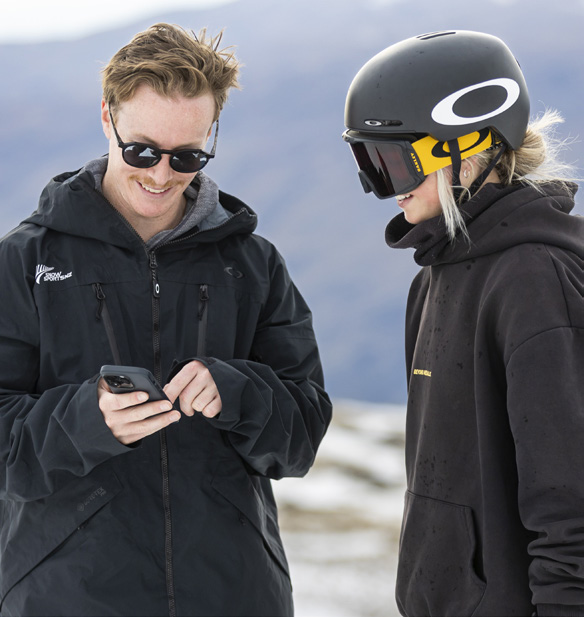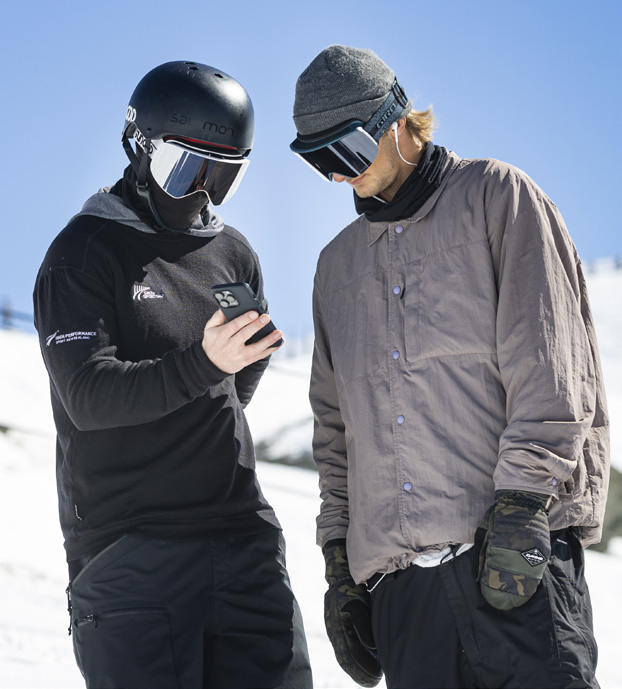Hamish McDougall
Hamish McDougall
- Coach Profile
Motivated by creating a sense of belonging, working with great people and a passion for skiing, first forged on the slopes of Temple Basin as a child, Hamish McDougall has developed into one of the most prominent and successful coaches at Snow Sports NZ.
As a coach to three of New Zealand’s elite freeskiers – Luca Harrington, a Youth Olympic Winter Games halfpipe medallist, 2022 Freeski Slopestyle Junior World Champion Ruby Star Andrews and Beijing 2022 Winter Olympian Ben Barclay – the responsibilities and challenges in the role are many and varied.
Yet Hamish’s end goal cannot be purely defined by medals, and he has a more philosophical ambition for what he would like to attain as a coach.
“The greatest feeling I have ever experienced in landing a world-class slopestyle run without a pinkie out of place,” said Hamish, a former slopestyle skier. “In my role as a coach, I want to share that experience with as many people as possible. To play a part in developing athletes to reach that point really excites and motivates me.”
A former prominent slopestyle skier, after Hamish just missed out on a place in the New Zealand team for the Sochi 2014 Olympic Winter Games, he reached a crossroads and faced several choices.
“I thought, do I re-rack and pursue a bid for the 2018 Winter Olympics, or do I finish my degree (in Law and Finance) and pursue a traditional 9-5 job?” explains Hamish. “I did, however, have a third option, which was to remain in the ski industry and pursue coaching. Coaching for me happened quite naturally. At that time I had a technical fascination. I am an analytical person, and breaking down tricks and how I could do them better was something that I spent quite a lot of time doing as an athlete, and I also tended to help friends. I think for many people, their coaching journey will start with the technical and then over time become more aspirational and people building, which is how it was for me.”
Taking on his first coaching role at Cardrona – where he quickly graduated to lead coach – he was appointed as a ski technician at Snow Sports NZ in 2016. With the long-term goal to specialise as a coach with the national organisation, this quickly evolved after working as a personal coach to freeskier Finn Bilous in his campaign up to and including the 2018 PyeongChang Winter Olympics,
Successfully applying for a full-time coaching position with Snow Sports NZ after the 2018 Games, he has, over the past six years, developed a reputation as an outstanding and highly respected individual within his field.
Working with a trio of quality athletes, he has helped them achieve World Cup podiums and medals on the international stage. Yet he identified one of his major successes as guiding Ben Barclay to the 2022 Beijing Winter Olympics.
Struggling to find his best form and described as “off-track” for the Beijing Games, Hamish supported Ben in putting together a plan to turn his form around.


Peeling back Ben’s approach to three critical factors, Hamish encouraged his athlete to focus on consolidating the tricks he did well, introduced daily psychological strategies into the daily training environment and also focused on motivation.
Identifying a basic error Ben made during a competition 16 months out for the Winter Olympics may have been “soul crushing” for the athlete but it was also “a big turning point” according to Hamish.
“We used that moment as a real motivation piece,” explains Hamish. “To remind Ben of that moment forced him to double down when times were tough.”
Ben bounced back by successfully navigating a route to Beijing on the back of a fantastic competition season in 2021- 22, and despite sustaining a bad knee injury in the countdown to the Games, he still came “within striking distance” of a podium finish, placing tenth in the freeski slopestyle final.
“The fact he was able to put himself in that position having been off-track for Beijing was something I was proud of,” adds Hamish. “The effort and how diligently he applied himself was transformational, and it made the experience very fulfilling as a coach.”
While the rewards as a coach can be huge, the role is far from easy. Hamish readily acknowledges that working with athletes who have aspirations to be among the best in the world is “a massive challenge”, so to have the support of “a knowledgeable and kind” coaching team at Snow Sports NZ – which includes Sean Thompson, Brad Prosser and Tom Willmott – should not be overlooked.
Believing that some of the most important skills as a coach is “to be able to set the vision and maintain motivation with an athlete in line with that vision.” He does, however, despite his technical and analytical nature, believe coaching is more art than science.
“I think this is especially true of the action sports,” he explains. “It is a subjectively judged sport that is judged
in a wildly variable environment. There are some scientific elements in terms of technique and mental skills, but in the heat of battle, there is a lot of thinking at the moment, which makes it more of an art form.”
So, given this viewpoint, how would Hamish describe his coaching style?
“I put the athletes in the driver’s seat,” he says. “My role
is to get them to succeed but in a way where they feel a great sense of self-efficacy and autonomy. They have to
be the primary person in charge of achieving their goals. In that way, the whole process can be much more fulfilling and help provide them the tools to succeed in anything moving forward.”
Working with a talented trio of athletes in the countdown to the 2026 Winter Olympics in Milano-Cortina is a huge privilege. At just 33, Hamish has the added benefit of not being so far apart in age from the athletes he coaches.
And given the quality of athletes under his wing he does harbours some big personal ambitions for the future.
“I’d be lying if I said I wasn’t motivated to assist the journey of a Winter Olympic medallist,” he adds. “In New Zealand we have only had three Winter Olympic medallists in history, so to be a part of that journey to maybe work with another would be special. It is what consumes me up until the next Olympics and beyond.
So why would he encourage others to make the same step into coaching?
“If done well, it can almost be a spiritual journey to enrich the lives of both the athletes and the coach,” adds Hamish. “The flip side is it can be very stressful and engaging. Yet to work in a space where intuition and people-building are paramount can be really enjoyable. If you are excited by a role that is a lot less rigid than a 9-5, it can be a fun and fulfilling career.”